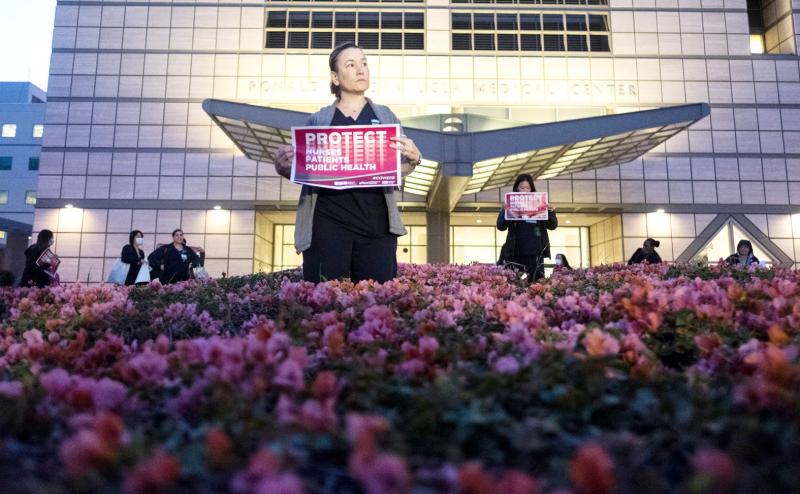More equipment is needed to protect the world’s nurses working on the front lines of the COVID-19 pandemic to save lives, the head of the International Council of Nurses (ICN) said.
“They are heroic. I think there is no other way to describe what they are doing at this moment,” said Howard Catton, a British nurse who is the council’s CEO.
Infection rates of 9 percent and 12 to 14 percent have been reported among health workers in Italy and Spain respectively, he said, adding that nurses have died in the two nations, as well as Iran and Indonesia.

Photo: AFP
“We have no doubt that the rate of infections is related in part to the lack of PPE — personal protective equipment,” he said at the ICN offices in Geneva.
“There is a global shortage and nurses obviously are at a higher risk given the people that they are caring for,” he said.
The federation represents 130 national associations and more than 20 million registered nurses.
The WHO has repeatedly called for countries and manufacturers to step up production of masks, gloves, gowns and other equipment for vulnerable health workers amid critical shortages.
As of yesterday, at least 803,704 people had been infected worldwide in the outbreak that began in December in China and had claimed at least 39,070 lives, the WHO said.
Catton said there had been problems with supply chains in hard-hit Italy and Spain, describing their health systems as “very close to being overwhelmed.”
Nurses worldwide take samples from COVID-19 patients, give them medicines and oxygen, and help incubate those in serious condition.
“They are working under intense pressure, often long hours, some working back-to-back shifts for days on end, even sleeping over in the hospital, the facility, in which they work,” Catton said.
Some nurses have been forced to reuse their gear or make their own masks and gowns, he added.
“Wearing personal protective equipment when it is available is not easy either... Simple things like going to the loo and eating are of course much more difficult,” he said.
Nurses across Africa and South Asia could be at greater risk as the virus moves to poorer settings.
“We are very concerned that those countries that have weaker, more fragile healthcare systems could very quickly become overwhelmed by this virus if it takes hold in their countries,” Catton said.
Nurses in Zimbabwe, fearing for their own safety, have been on strike due to a lack of information and protective gear, he said.

The US government has signed defense cooperation agreements with Japan and the Philippines to boost the deterrence capabilities of countries in the first island chain, a report by the National Security Bureau (NSB) showed. The main countries on the first island chain include the two nations and Taiwan. The bureau is to present the report at a meeting of the legislature’s Foreign Affairs and National Defense Committee tomorrow. The US military has deployed Typhon missile systems to Japan’s Yamaguchi Prefecture and Zambales province in the Philippines during their joint military exercises. It has also installed NMESIS anti-ship systems in Japan’s Okinawa

‘WIN-WIN’: The Philippines, and central and eastern European countries are important potential drone cooperation partners, Minister of Foreign Affairs Lin Chia-lung said Minister of Foreign Affairs Lin Chia-lung (林佳龍) in an interview published yesterday confirmed that there are joint ventures between Taiwan and Poland in the drone industry. Lin made the remark in an exclusive interview with the Chinese-language Liberty Times (the Taipei Times’ sister paper). The government-backed Taiwan Excellence Drone International Business Opportunities Alliance and the Polish Chamber of Unmanned Systems on Wednesday last week signed a memorandum of understanding in Poland to develop a “non-China” supply chain for drones and work together on key technologies. Asked if Taiwan prioritized Poland among central and eastern European countries in drone collaboration, Lin

Renewed border fighting between Thailand and Cambodia showed no signs of abating yesterday, leaving hundreds of thousands of displaced people in both countries living in strained conditions as more flooded into temporary shelters. Reporters on the Thai side of the border heard sounds of outgoing, indirect fire yesterday. About 400,000 people have been evacuated from affected areas in Thailand and about 700 schools closed while fighting was ongoing in four border provinces, said Thai Rear Admiral Surasant Kongsiri, a spokesman for the military. Cambodia evacuated more than 127,000 villagers and closed hundreds of schools, the Thai Ministry of Defense said. Thailand’s military announced that

CABINET APPROVAL: People seeking assisted reproduction must be assessed to determine whether they would be adequate parents, the planned changes say Proposed amendments to the Assisted Reproduction Act (人工生殖法) advanced yesterday by the Executive Yuan would grant married lesbian couples and single women access to legal assisted reproductive services. The proposed revisions are “based on the fundamental principle of respecting women’s reproductive autonomy,” Cabinet spokesperson Michelle Lee (李慧芝) quoted Vice Premier Cheng Li-chiun (鄭麗君), who presided over a Cabinet meeting earlier yesterday, as saying at the briefing. The draft amendment would be submitted to the legislature for review. The Ministry of Health and Welfare, which proposed the amendments, said that experts on children’s rights, gender equality, law and medicine attended cross-disciplinary meetings, adding that